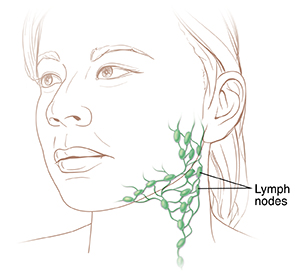Lymph Node Swelling in the Neck, No Antibiotic Treatment
You have a swollen, or enlarged, lymph node (gland) in your neck. The lymph nodes are part of the immune system. They're found throughout your body, but are most visible where they sit just under the skin. These include under the jaw and along the side of the neck, in the armpits, and in the groin. Infection or inflammation are the main causes of swollen lymph nodes in the neck area. In some cases, cancer is the cause. The lymph nodes may be a little sore.
Antibiotics aren't used for swollen lymph nodes unless the nodes are infected by germs (bacteria). A viral infection with swollen glands isn't treated with antibiotics. Instead, you can use warm compresses and pain medicine to treat the swollen glands. The pain will get better over the next 7 to 10 days. The swelling may take 1 to 2 weeks or more to go away.
If a bacterial infection occurs inside the lymph node, it becomes very painful. The nearby skin gets red and warm. You may also have a fever. If this happens, call your health care provider. You may need to take antibiotics. You may also need to have the lymph node drained.

Home care
Follow these guidelines when caring for yourself at home:
-
Make a warm compress by running warm water over a washcloth. Put the compress on the sore area until the compress cools off. Repeat this for 20 minutes. Use the compress 3 times a day for the first 3 days, or until the pain and redness start to get better. The heat will make more blood flow to the area and speed the healing process.
-
You may use acetaminophen or ibuprofen to control pain and fever, unless another medicine is prescribed. Don’t use ibuprofen in children under 6 months of age. If you have chronic liver or kidney disease, talk with your health care provider before using these medicines. Also, talk with your provider if you’ve had a stomach ulcer or digestive tract bleeding. Don’t give aspirin to anyone under 18 years of age who is ill with a fever. It may cause severe liver damage.
Follow-up care
Follow up with your health care provider, or as advised.
When to get medical care
Call your health care provider right away if:
-
Redness appears on the skin over the lymph node.
-
Swelling or pain in the lymph node is getting worse.
-
The lymph node is getting soft in the middle.
-
Pus or fluid drains from the lymph node.
-
You have trouble breathing or swallowing.
-
You have a fever of 100.4°F (38°C) or higher, or as advised by your provider.
-
You have chills.
-
You have questions or concerns.
Online Medical Reviewer:
Raymond Kent Turley BSN MSN RN
Online Medical Reviewer:
Sabrina Felson MD
Online Medical Reviewer:
Sravani Chintapalli Researcher
Date Last Reviewed:
2/1/2025
© 2000-2025 The StayWell Company, LLC. All rights reserved. This information is not intended as a substitute for professional medical care. Always follow your healthcare professional's instructions.